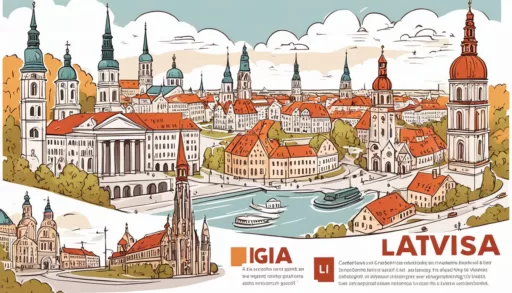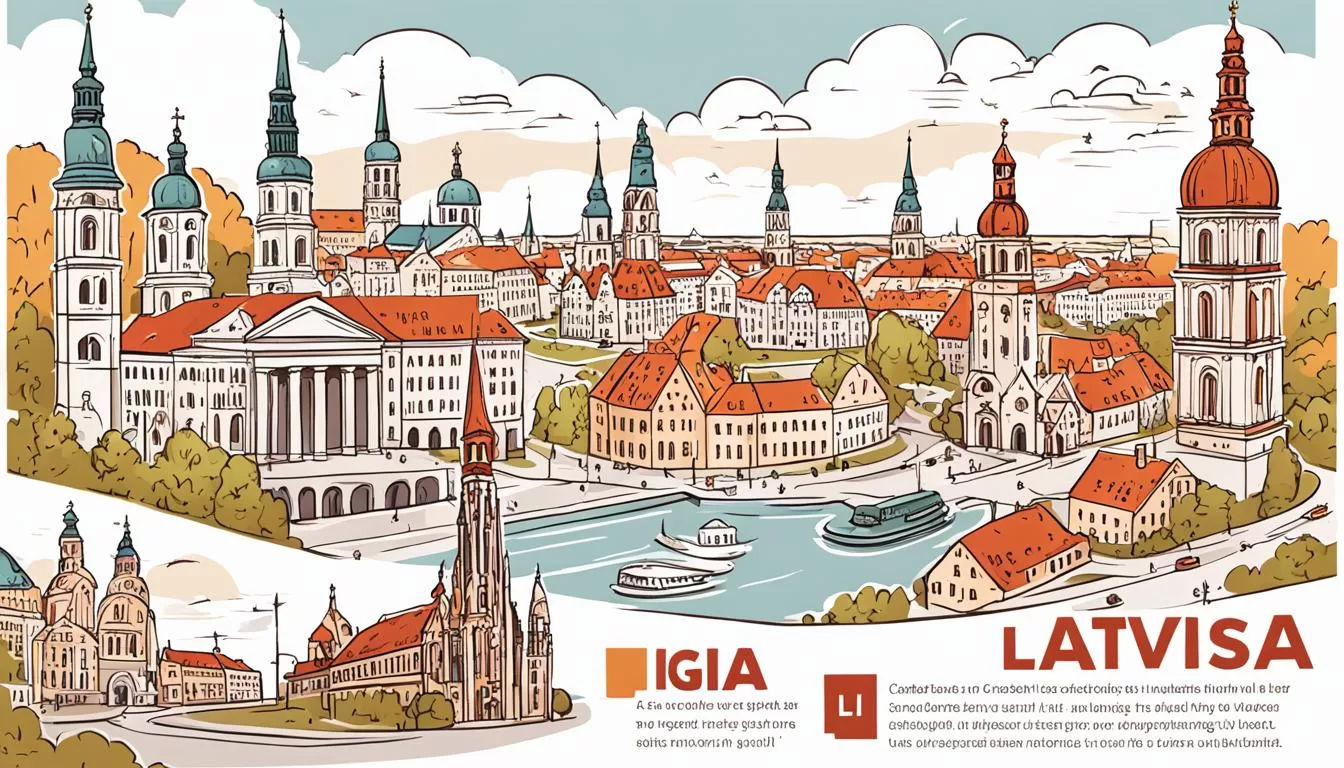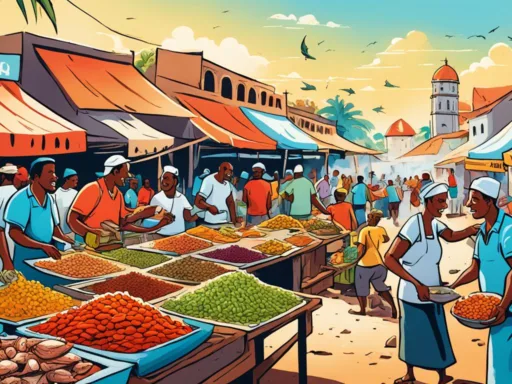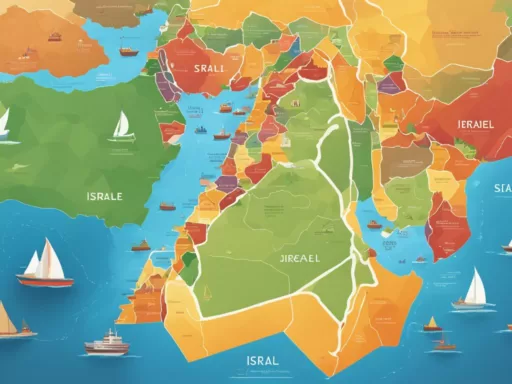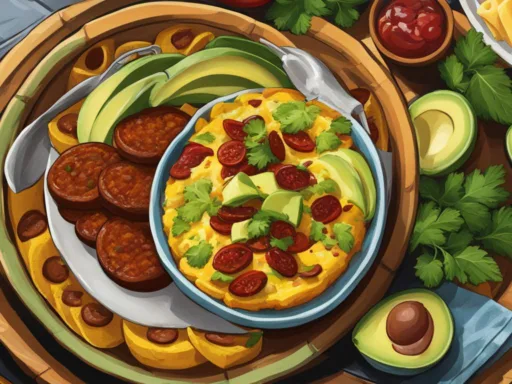The tapestry of languages spoken in Latvia paints a vibrant picture of its cultural richness and historical depth. At the heart of this linguistic landscape is the Latvian language, the official state tongue, and a proud member of the European Union’s roster of official languages. Nestled in the northern reaches of Europe, amidst the Baltic States, Latvia is home to a population where the majesty of Latvian echoes from the bustling cities to the serene countryside. With approximately 1.5 million global speakers, the Latvian language boasts a significant demographic within Latvia itself, illustrating its pivotal role in the nation’s day-to-day affairs.
Despite the prominence of Latvian, the language scene in Latvia is not monolithic. It reflects a rich blend of linguistic influences and a deep-seated history of exchanges with neighboring nations. This multilingual reality ensures that Latvia stays abreast with global dynamics while cherishing its unique linguistic identity. As the official language, Latvian upholds not just the spirit of communication but also the essence of national pride, shaping Latvia’s voice in a multilingual world.
Key Takeaways
- The Latvian language stands as the cornerstone of Latvia’s linguistic identity and is one of the official languages in Latvia.
- Latvian is spoken by a substantial population within Latvia, underscoring its significance in local and international arenas.
- The presence of other languages in Latvia reflects the country’s historical narratives and demographic intricacies.
- Latvia’s government has put forth robust policies to ensure the proliferation and preservation of the Latvian language.
- While Latvian retains official status, the country’s linguistic diversity encompasses various minority languages and dialects.
- Understanding the languages spoken in Latvia offers a window into the nation’s rich culture and societal evolution.
- Latvian’s role in education, governance, and media reaffirms its position as the primary medium of communication in the nation.
The Latvian Language: An Overview
The essence of Latvian identity is profoundly rooted in its language. A tongue steeped in history, the Latvian language serves as a bastion of the nation’s cultural heritage and is a testament to its endurance through changing times. With its rich array of sounds and unique script, Latvian stands out as a linguistic treasure within the Indo-European family. The careful formulation of language policy in Latvia has played a crucial role in fostering an environment where Latvian thrives, ably supported by initiatives aimed at safeguarding the dialects and minority languages that contribute to Latvia’s diverse soundscape.
History and Development of Latvian
From the synergy of ancient Baltic tribal tongues to the influences of German, Polish, and Lithuanian, the Latvian language has evolved over many centuries. Marking its first print appearance in the mid-16th century, Latvian underwent standardization during the Latvian National Awakening—a significant cultural revolution that spurred its preservation and growth. Notable figures, such as Kārlis Mīlenbahs and Jānis Endzelīns, were instrumental in crafting a standardized lexicon and orthography, thus shaping Latvian into the rich and dynamic language it is today.
The Latvian Alphabet and Its Unique Characteristics
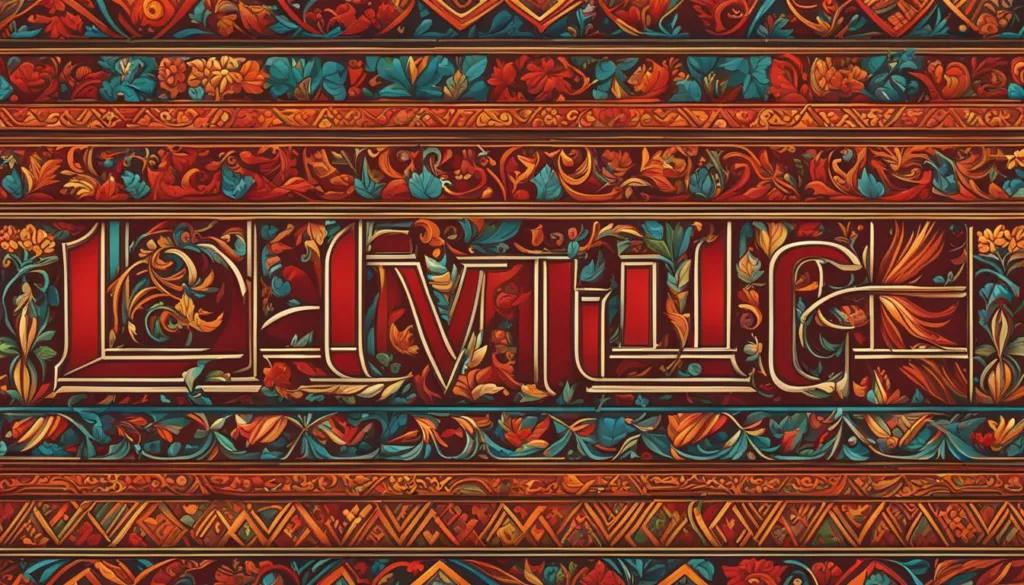
The Latvian language is recognized for its distinctive 33-letter alphabet, born from the Latin script and enriched with specific diacritics to create a range of nuanced vocalic and consonantal sounds. These characters, such as those bearing carons and macrons, allow for the accurate expression of Latvian’s phonetic complexity, rendering it it both beautiful to the eye and melodious to the ear. This unique alphabet is not just a practical tool for literacy but also a cultural emblem that unites its speakers.
Official Status and Language Policy in Latvia
In reaffirming its independence in 1991, Latvia re-established Latvian as its sole official language, reinstating its centrality in state and public life. This move was complemented by comprehensive language policies geared towards promoting the use and learning of Latvian throughout the population. To this end, government-funded educational programs and innovative bilingual instruction in public schools play pivotal roles. These efforts are coupled with cultural preservation initiatives that ensure the vitality of both Latvian dialects and various Latvian minority languages.
- Latvian language education programs are instrumental in integrating all demographics into a unified linguistic fabric.
- Language policies in Latvia underscore the significance of linguistic inclusion while respecting the country’s multilingual heritage.
- Bilingual education systems stand as powerful tools for fostering proficiency and ensuring the prosperity of Latvia’s diverse linguistic repertoire.
Languages spoken in Latvia: Latvian Dialects and Minority Languages
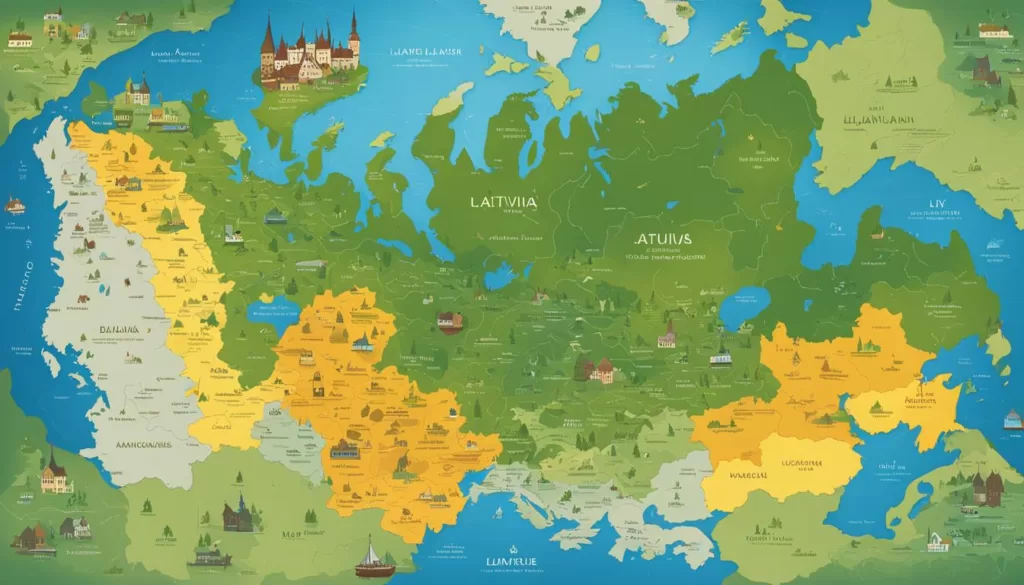
Latvia’s diverse linguistic landscape extends far beyond the official state language, branching into a variety of Latvian dialects and Latvian minority languages. This multilingual panorama is not only a testament to the nation’s rich cultural fabric but also highlights the essence of multilingualism in Latvia. The Latvian language itself is not uniform across the country; it varies in form and cadence as one travels from the quaint hamlets in Courland to the rustic landscapes of Latgale.
In the domain of dialects, there are three primary ones that linguists typically identify: the Livonian dialect, Upper Latvian dialect, and Middle Latvian dialect. Each dialect possesses its unique idiolect, sculpted by the region’s history and its inhabitants’ daily lives. The resonant Livonian dialect, for example, echoes the linguistic influences of the indigenous Livonian people, offering a window into a different chapter of Baltic history. On the other hand, Upper and Middle Latvian dialects mirror the intricacies of inland linguistic evolution.
Latvia’s linguistic diversity is further accentuated by the languages of various ethnic minorities that have long called Latvia their home. Significant among these are the Russian, Polish, Ukrainian, Belarusian, and Lithuanian languages, which are predominantly spoken within their respective ethnic communities. These languages, each a reflection of the intimate ties Latvia shares with its neighbors, remain vibrantly alive in family conversations and community gatherings especially in places like Latgale and Semigallia.
The Latgalian language stands as a unique symbol of regional pride in Latgale. Its status, debated between being a separate language or a Latvian dialect, is emblematic of the dynamic nature of linguistic categorization and identity in Latvia. – Local Linguist
It’s challenging to encapsulate the entire spectrum of Latvia’s spoken languages without a nod to the Latgalian language. Whether considered a distinct language or a vibrant dialect of Latvian, Latgalian represents the historical and cultural autonomy of the Latgale region. It is the living testimony to the country’s commitment to honoring and preserving its multifaceted linguistic heritage.
Below is a comparative overview of the key dialects and minority languages that contribute to the marvelous tapestry of sounds in Latvia:
| Language/Dialect | Region | Speakers | Characteristics |
|---|---|---|---|
| Livonian Dialect | Courland | Minority | History-rich, Livonian influence |
| Upper Latvian Dialect | Central and Eastern Latvia | Widespread in rural areas | Distinct phonetic features |
| Middle Latvian Dialect | Zemgale and Vidzeme | Common among locals | Lexical uniqueness |
| Latgalian | Latgale | Substantial population | Subject of linguistic debate |
| Russian | Urban areas, Latgale | Large minority community | Prominent minority language |
| Polish | Latgale, Semigallia | Smaller communities | Regional significance |
As we observe the linguistic horizon of Latvia, it’s evident that the country’s language story cannot be told without the chorus of its dialects and the voices of its minority language speakers. Latvia’s linguistic policy reflects an inclusive stance, taking into account the reality of multilingualism in Latvia and fostering a climate where all languages are respected and preserved for future generations. This harmonious blend of Latvian dialects and Latvian minority languages echoes the country’s open embrace of both its own heritage and the languages of those who have come to call Latvia their home.
The Russian Language in Latvia: Influence and Usage
Positioned at the crossroads of Eastern and Western Europe, Latvia has played host to a rich intermingling of cultures and languages. Among these, the Russian language has left an indelible mark, engrained deeply in the country’s societal fabric. As a former lingua franca Latvia and a cornerstone of dialogue, Russian’s etched legacy continues to inform the language dynamics in contemporary Latvia.
Historical Context of Russian in Latvian Society
The presence and influence of the Russian language in Latvia are inextricable from the historical events that shaped the nation. The Soviet era designated Russian as the lingua franca across Latvia, embedding it firmly within daily communication streams, particularly in urban environments and the Latgale region. This influence persists today, encapsulating a significant chapter in Latvia’s linguistic tapestry and continuing to engage a considerable segment of Latvia’s population.
Current Demographics and Russian-Language Media
In today’s Latvia, the Russian language maintains a robust position amongst the older generations, cultivated during the decades of the Soviet regime. Despite the ascendancy of Latvian post-independence, Russian language influence in Latvia remains salient, evident in the sheer volume of media catered to the Russophone community. This media presence serves as a vital channel, sustaining the cultural and linguistic continuity for the large minority of Russian speakers within the nation.
The following offers a snapshot of Russian language media outlets in Latvia, evidencing the enduring nature of Russian’s influence within the country.
| Type of Media | Scope | Description |
|---|---|---|
| Television | Nationwide | Channels featuring news, entertainment, and cultural programming in Russian |
| Newspapers | Regional and National | Publications serving as a primary news source for the Russian-speaking populace |
| Radio Stations | Local and National | Providing a mixture of music, talk shows, and news segments in Russian |
| Online Portals | Internet | Digital platforms with comprehensive Russian-language content catering to diverse interests |
The bilingual narrative of today’s Latvia reflects a milieu where Latvian and Russian coexist. This parallel dialogue not only articulates the journey of the nation’s past struggles but also delineates a path of cooperative cultural and linguistic cohabitation.
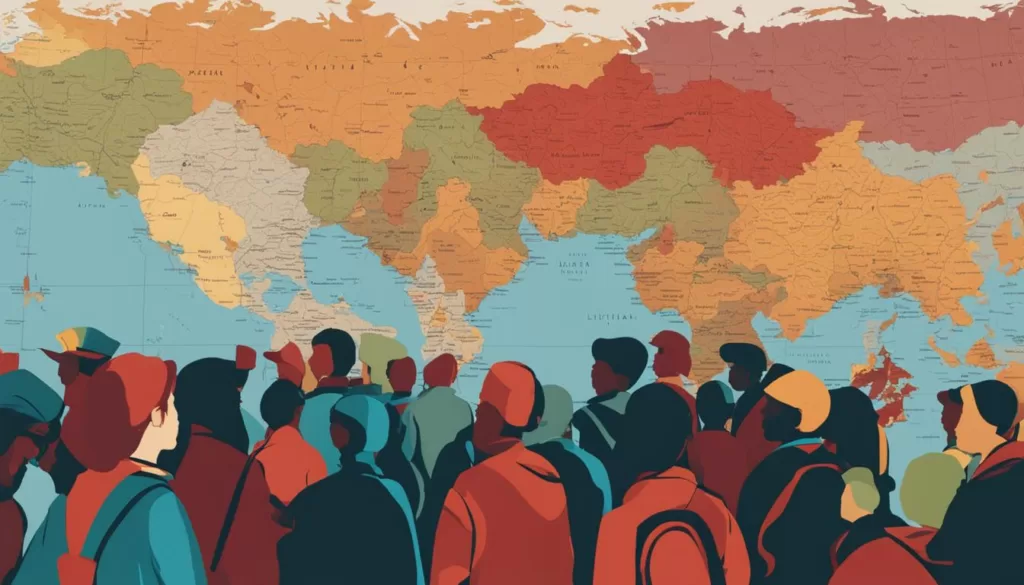
English and Other Foreign Languages in Modern Latvia
In the cultural mosaic that is Latvia’s multilingual society, English language proficiency Latvia has become increasingly important. English, the lingua franca of the global village, finds its significance magnified within this small Baltic nation, more so among the youthful, ambitious generations. As Latvia willingly adapts to the fast-paced rhythm of international communication, business transactions, and the vast digital world, English fluency is actively pursued and highly valued.
Manifesting a clear shift in linguistic focus since the nation reclaimed its independence, English has surpassed Russian as the foreign language of choice, painting a modern portrait of multilingualism Latvia. This profound interest in English emanates from its utility in opening doors to global opportunities, an asset that the forward-looking Latvian educational system recognizes and encourages.
The tourism domain, in particular, measures the palpable pulse of English proficiency. As Latvia heaves its historic beauty onto the world stage, professionals with adept command over English position themselves at the forefront, facilitating interactions and experiences for the international traveler. From the cobblestone streets of Riga to the sprawling landscapes of Gauja National Park, English speakers enhance the visitor experience, underscoring the connection between language skills and economic progress.
However, the appreciation for languages in Latvia isn’t confined to the realms of English. Anchoring to its urban legacy, the German language continues to echo amongst the academic and cultural communities. Similarly, the Livonian language, though nearing extinction, is honored as a poignant reminder of Latvia’s historical tapestry and serves as an enduring symbol of cultural identity and resilience.
Let’s explore the relevance of these languages, contrasting their roles in Latvian society today:
| Language | Significance in Modern Latvia | Usage Context |
|---|---|---|
| English | Most studied foreign language post-independence | Education, Tourism, Business |
| German | Historic urban sway, academic relevance | Cultural Events, Historical Studies |
| Livonian | Cultural heritage, nearly extinct | Linguistic Studies, Heritage Preservation |
This linguistic evolution reflects not merely a trend but a strategic embrace of global currents while venerating local and historic nuances. Foreign languages in Latvia are more than mere mediums of communication; they are threads intricately woven into the societal fabric, each carrying their unique shade and strength. In recognizing and advocating the significance of these languages, Latvia bridges its storied past with a cosmopolitan present and an even more interconnected future.
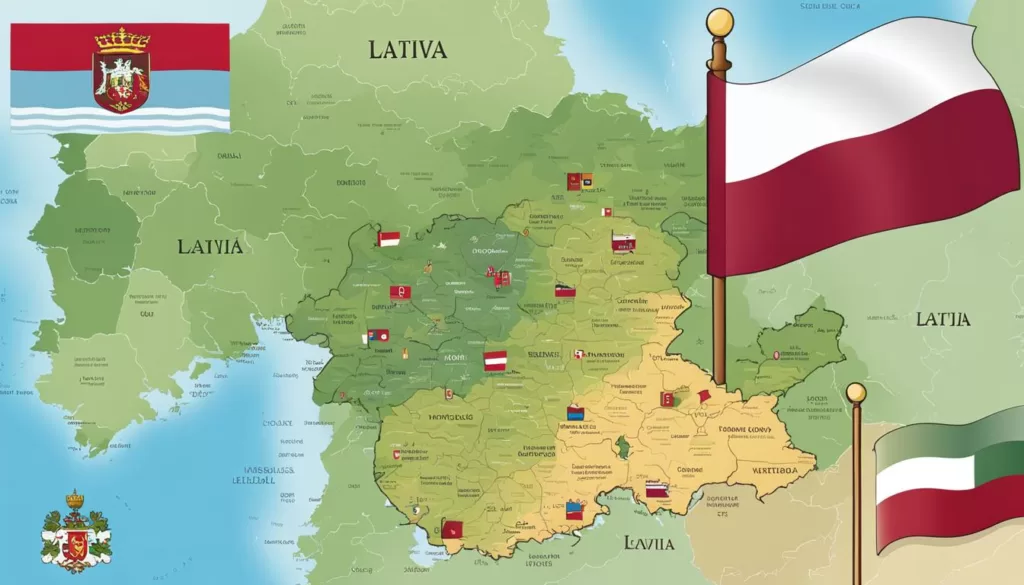
Conclusion: Celebrating the Linguistic Tapestry of Latvia
The linguistic panorama of Latvia paints a portrait of a nation that cherishes its roots while embracing the winds of change. At the forefront of this celebration is the Latvian language, a vital strand in the nation’s identity and cultural expression. Yet, Latvia’s narrative is far richer, encompassing an incredible diversity of languages spoken across its territories—from the tonal variations of indigenous dialects to the robust presence of minority tongues. Each language, with its distinctive cadence and history, contributes to the dynamic and multifaceted linguistic mosaic that makes Latvia truly unique.
As we reflect on the Latvian language significance, its role extends far beyond the bounds of communication, serving as a bastion of national pride and tradition. However, in the contemporary landscape of globalization, languages such as Russian and English have established a formidable presence, encapsulating the history and pragmatism of a society that values practicality alongside heritage. The result is a vibrant confluence where the past and present coalesce, offering a model of harmony between preservation and progress in Valdis Dombrovskis’s nation—and, by extension, the European Union.
The future of this Baltic state rests on the celebration of its linguistic diversity, acknowledging the rich tapestry of voices that contribute to the collective narrative. The diversity of languages spoken in Latvia embodies tolerance, inclusivity, and unity, a triad that stands as the cornerstone of Latvia’s continuing legacy. By fostering this reverence for language, Latvia not only honors its own story but also enriches the global dialogue, inviting the world to partake in its linguistic and cultural journey.
FAQ
What languages are spoken in Latvia?
The most commonly spoken language in Latvia is Latvian, which is the official state language. Russian is also widely spoken, especially by the minority ethnic Russian community. Other minority languages include Polish, Ukrainian, Belarusian, and Lithuanian. English is increasingly common, particularly among the younger generation and within business and tourism sectors.
Is Latvian the only official language in Latvia?
Yes, Latvian is the only official language in Latvia, but the country has a robust language policy to support linguistic diversity, including the protection of minority languages.
Can you explain the history and development of the Latvian language?
The Latvian language, an Indo-European language within the Baltic group, has developed over centuries. It has been influenced by various historical periods and ties, and it was standardized during Latvia’s National Awakening. The language has its roots in the assimilations of neighboring Baltic tribes’ languages.
What are some unique characteristics of the Latvian alphabet?
The Latvian alphabet consists of 33 letters, based on its Latin script origins and modified by diacritical marks such as macrons and carons, which affect pronunciation and stress, giving Latvian its unique sound and orthography.
How is the Latvian language officially protected and promoted in Latvia?
Latvia’s language policy, established after regaining independence in 1991, focuses on promoting the usage and education of the Latvian language while supporting minority languages. This is achieved through language centers, government-funded programs, and bilingual education systems.
Are there any dialects of Latvian?
Yes, there are several dialects of Latvian, including Livonian, Upper Latvian, and Middle Latvian, each with its own phonetic and lexical distinctions. There is also the Latgalian language, which some consider a separate language, while others view it as a dialect of Latvian.
What is the historical context of Russian language use in Latvian society?
The use of the Russian language in Latvia is heavily influenced by the Soviet occupation when Russian served as the lingua franca. It resulted in a large Russian-speaking minority in Latvia, which is still prominent today, particularly among older generations.
What is the state of Russian-language media in Latvia?
Russian-language media is active in Latvia, targeting the Russophone population with newspapers, websites, and broadcasts. This media presence reflects the bilingual nature of Latvia, where Latvian and Russian coexist.
How prevalent is English language proficiency in modern Latvia?
English language proficiency is increasingly widespread among the younger population of Latvia. It has become the most studied foreign language after independence and is seen as essential for international business, communication, and tourism.
What role do other foreign languages play in Latvian society?
Besides English, other foreign languages such as German have historical importance in Latvia. While less common now, they are still taught in schools and used in some business and cultural contexts. Livonian, once native to Latvia but nearly extinct, is a symbol of the nation’s historical linguistic diversity.
What does the diversity of languages spoken in Latvia signify for its culture?
The diversity of languages in Latvia reflects its complex history, cultural narratives, and demographic changes. It embodies the country’s commitment to preserving its heritage, fostering multilingualism, and recognizing the importance of the Latvian language as a core element of national identity.
